Five talking points from stage four of the Tour de France 2021
Cavendish is back, the rider protest, and the right kind of drama - don't miss these moments
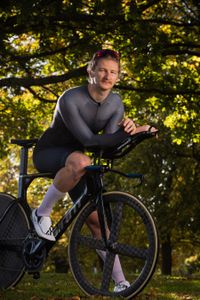
Mark Cavendish is back
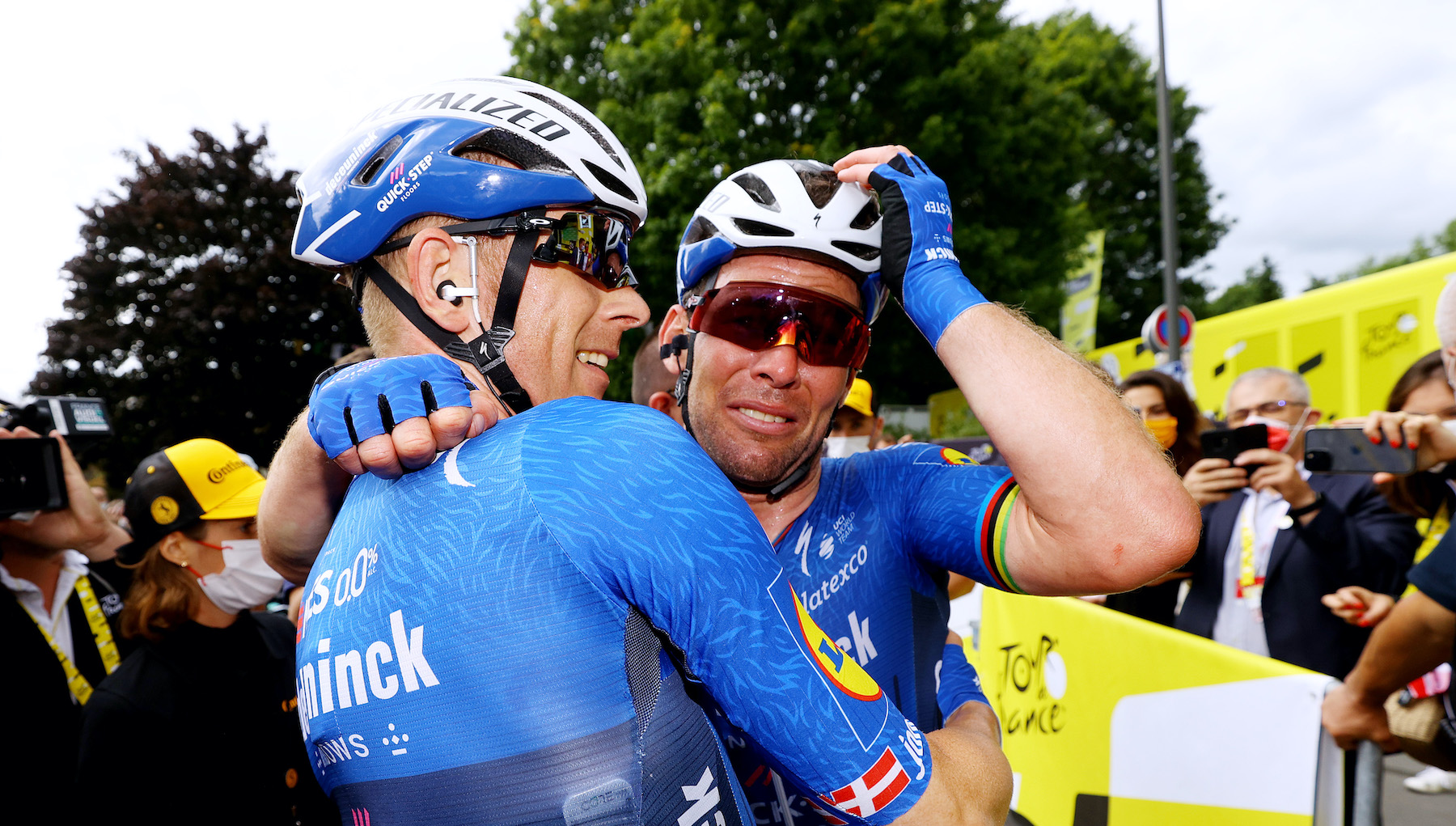
Mark Cavendish’s selection for the Tour de France may have been the biggest surprise of the year...until he went and won a stage.
While the British sprinting star had been looking somewhere near his best this year, getting back on the top step after three winless years, Cavendish’s 2021 victories all came from lower tier races like the Tour of Turkey.
For that reason Cavendish wasn’t expected to be chosen for the Tour, as Deceuninck - Quick-Step were more likely to favour their number one sprinter Sam Bennett with his proven track record at WorldTour level this year.
But after a knee injury in the weeks before the Tour raised questions about Bennett’s form, along with a bizarre public dispute with Patrick Lefevere, Mark Cavendish packed his bags to and set off to Brittany.
Then on the first sprint opportunity of this year’s Tour on stage four, Cavendish admitted he was nervous, having never expected to race the Tour de France again.
It wasn’t to be for Deceuninck on that day in Pontivy, as most of the team were caught up behind the numerous crashes in the final, but they didn’t have to wait long to deliver their man to the finish.
It’s hard to overstate what this win means to Cavendish and cycling as a whole - he hasn’t race the Tour since 2018 and hasn’t won a stage since 2016, once of his most dominant seasons with four Tour stages.
The latest race content, interviews, features, reviews and expert buying guides, direct to your inbox!
This wasn’t his first success in Fougères either, as the 36-year-old won a stage there in 2015 while racing with his current team, then named Etixx-Quick Step.
He now sits on 31 Tour de France stage victories, cementing his position as the most successful sprinter in Tour history, and putting him just three victories behind the all-time record held by Eddy Merckx, 34 wins.
But beyond the stats, it was the sheer emotion that immediately struck Cavendish that tells the real story.
After fearing the end of his career last season, battling through illness, injury and mental health struggles, Mark Cavendish is back.
A welcome quiet day for the peloton
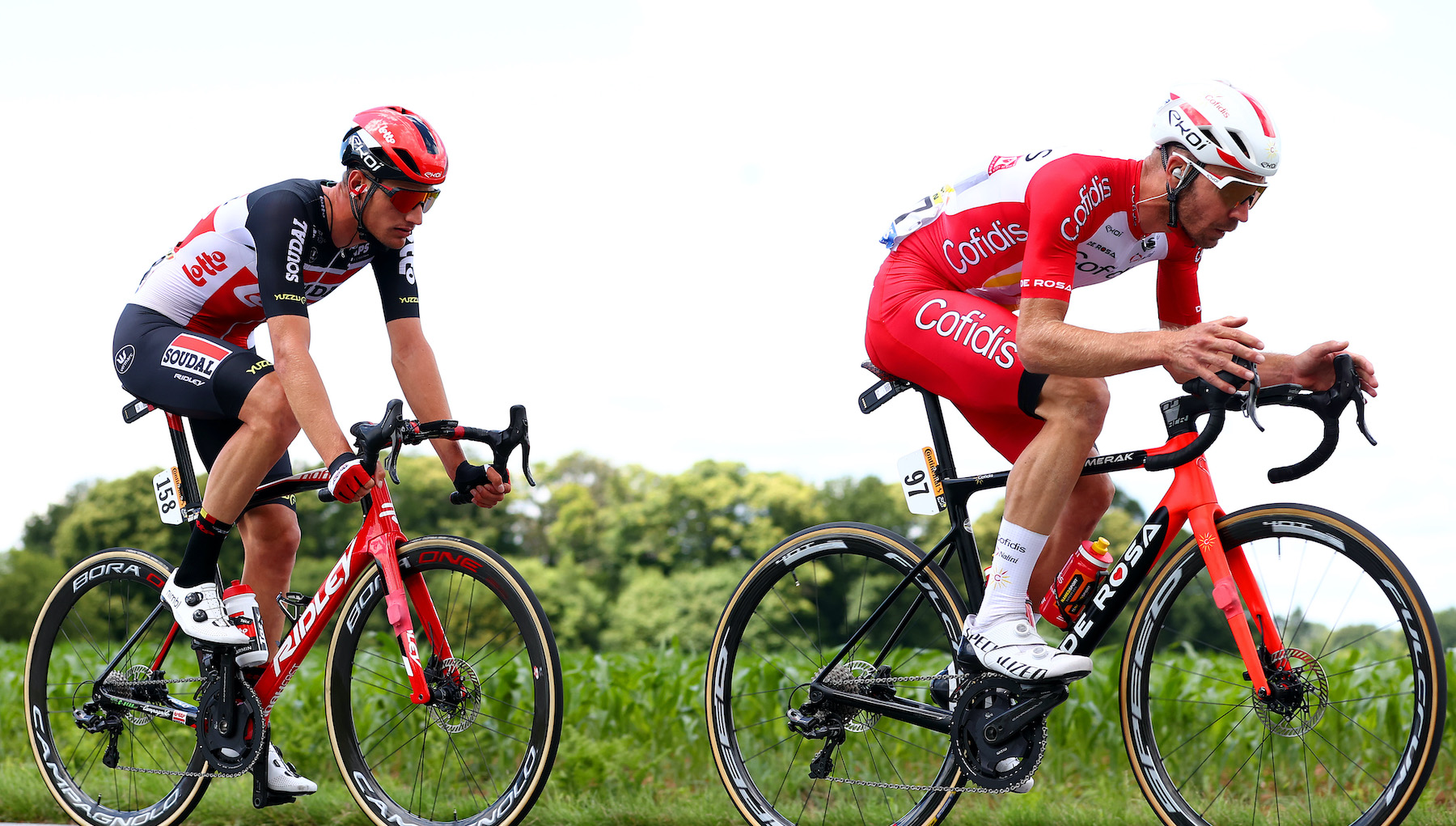
Stage three was one of the most chaotic stages in recent memory at the Tour - and that’s a high bar.
We saw two of the general classification favourites, Primož Roglič and Geraint Thomas, both go down in separate incidents while Caleb Ewan was forced out of the race after a crash in the final 300m.
But after all that unwelcome action, stage four was a much quieter affair.
There were no notable incidents either in the two-rider breakaway or in the peloton on day four.
It was only the two riders committed to an attack on the day, with Brent Van Moer (Lotto-Soudal) and Pierre-Luc Pèrichon (Cofidis) attacking early after a minor delay to proceedings at kilometre zero, with the pair never pulling out more than a three-minute advantage.
Alpecin-Fenix put in a huge amount of the pulling-work back in the bunch with Deceuninck - Quick-Step also ultilising Tim Declerq to keep the break within range.
Alpecin-Fenix put in a huge amount of the pulling-work back in the bunch with Deceuninck - Quick-Step also utilising Tim Declerq to keep the break within range.iggest haul in the peloton.
Luckily it was a quiet day for the GC contenders, with both Thomas and Roglič resting and nursing their wounds in the bunch, finishing safely ahead of the pivotal time trial on stage five.
After yesterday’s upheaval, it was a welcome change for the riders.
Minor safety protest fails to make waves
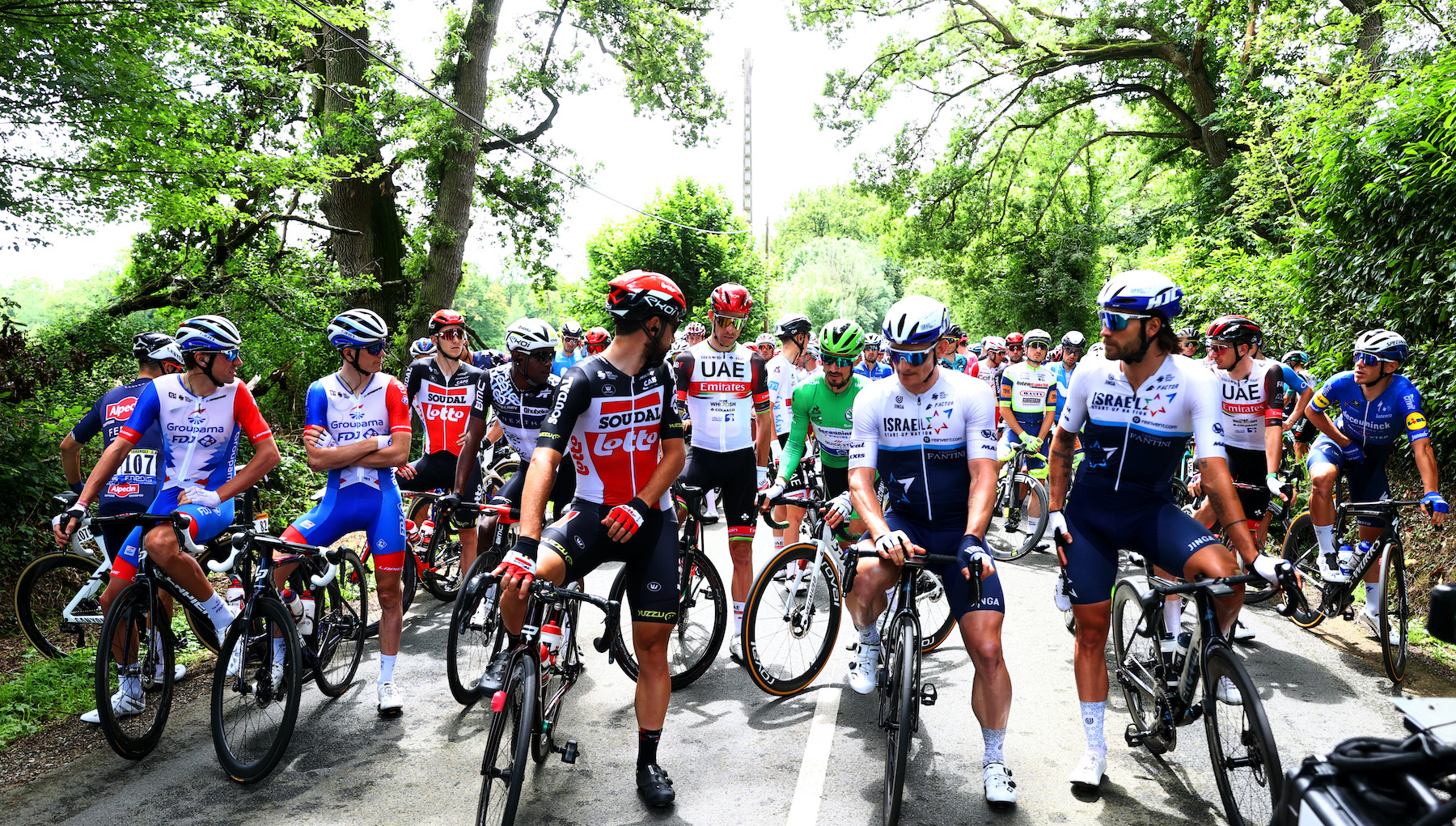
The number and severity of crashes on stage three caused waves both within the Tour de France peloton and the wider sporting world.
As more details emerged about the chaos on day three, including the revelation that riders wanted the GC times taken from the 8km mark rather than the usual 3km but the request was denied, news also suggested that riders were planning a protest at the start of stage four.
While we’ve seen rider protests in the past, this one was slightly more bizarre.
As riders approached kilometre zero at the end of the neutralised start, a slightly agitated André Greipel (Israel Start-Up Nation) emerged at the front of the bunch and shared words with Julian Alaphilippe (Deceuninck - Quick-Step).
The bunch then came to a halt in the road, waiting a brief moment before Alaphilippe appeared to take matters into his own hands and rode off alone, with the rest of the bunch sheepishly deciding to follow.
That was followed by another exchange of words between Greipel and Alaphilippe.
While the message was clear, that riders are concerned about their safety in sprint finishes, it’s not likely Tour de France organiser ASO or the UCI will take any note of this easily-ignored protest.
Bizarre moment almost throws the race for the sprinters
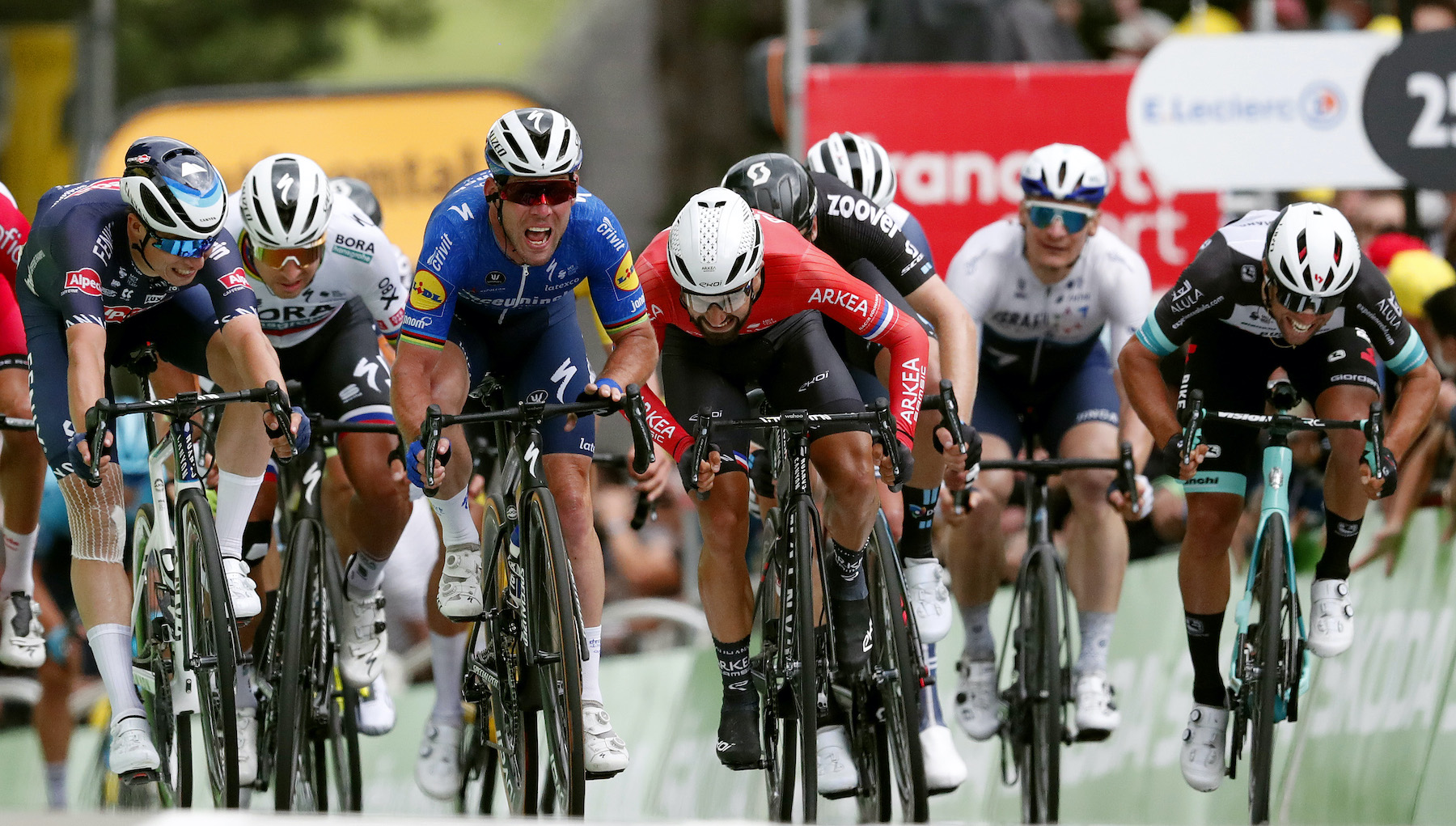
After that initial protest, there was another slightly unusual moment right into the final of the race, as a lone leader powered his way to the finish.
As Brent Van Moer (Lotto-Soudal) rode away from the peloton and threatened to steal a victory with 10km to race, there was no sense of urgency in the bunch, and at one point it even appeared that Ineos Grenadiers and Bora-Hansgrohe might have been blocking at the front of the bunch to prevent any meaningful chase.
With the sprint teams nowhere to be seen, it almost seemed like this might be a secondary, and arguably more effective protest, letting Van Moer ride clear to secure the stage win uncontested.
Eventually the sprint trains did get into gear, setting up a thrilling cat and mouse to the final, but suggesting this wasn’t an extension of the protest but just a very ill-timed lull in the pace that threatened to throw the second sprint of the race to the breakaway.
An odd-moment, but one that only contributed to the thrills that followed.
A thrilling finish (this time for the right reasons)
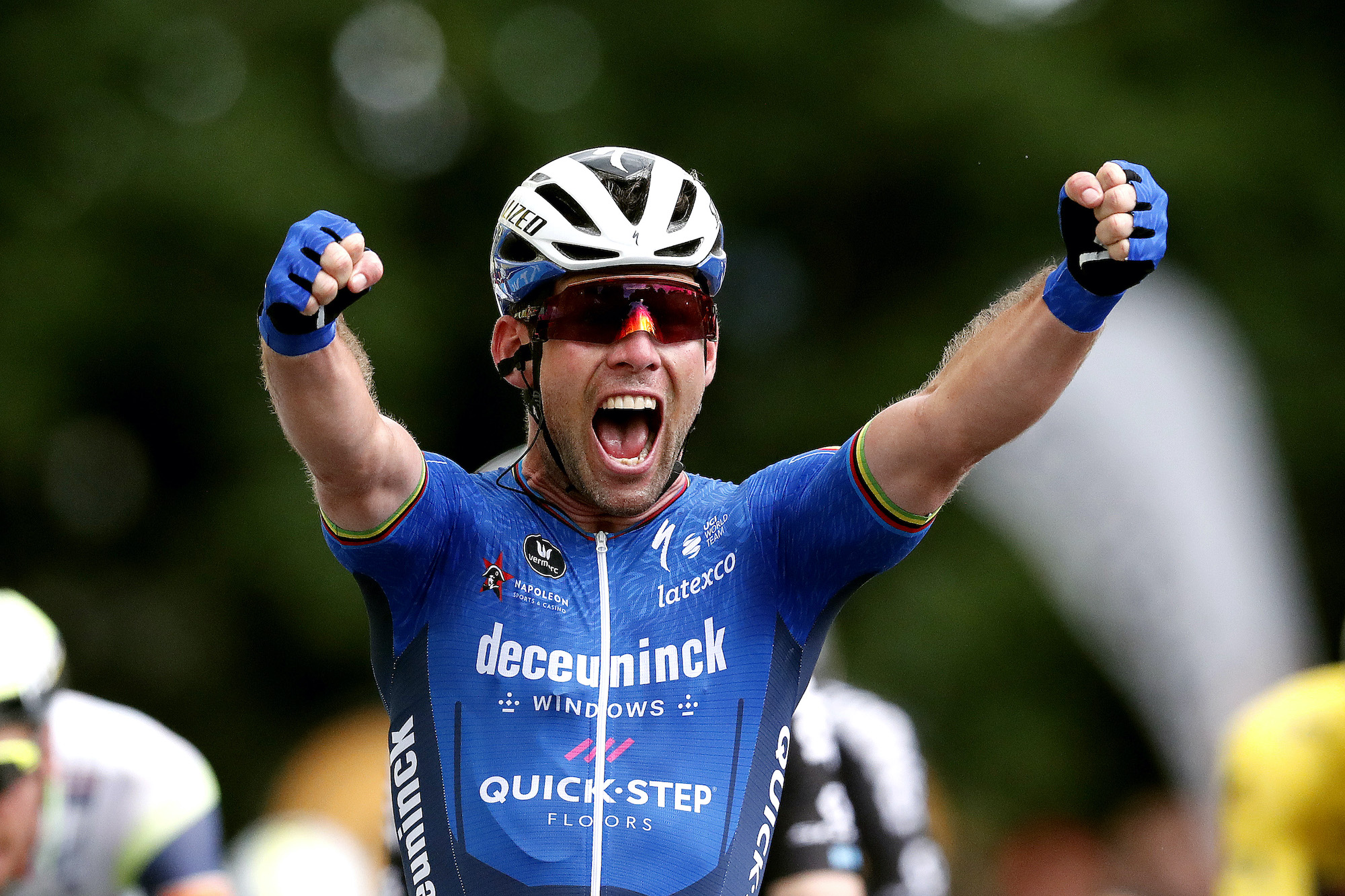
After the upsets of stage three, stage four was the antidote we all needed.
Following the calm day throughout, the excitement came thick and fast into the final 10km, starting as the sprint trains started to show no interest in catching Van Moer.
The Belgian had attacked and dropped his breakaway companion Pierre-Luc Périchon and was on a determined march to the line, alone.
With 1-06 over the peloton 10km from the finish, it actually looked in the balance for Van Moer, who won his first pro race at the Critèrium du Dauphinè this year.
As the chase stalled behind, with GC teams appearing to block the sprint trains in, Van Moer began to dream of a revolutionary victory.
The tides turned however when Deceuninck - Quick-Step committed the entire weight of their squad to the chase, knocking Van Moer down to a 30-second advantage in the blink of an eye.
But as the pace slowed slightly again, Van Moer made it into the final kilometre out front, in sight of the peloton with the dream still alive however.
Into the final 300m and Van Moer still hadn’t been caught, but Alpecin-Fenix were now more than alert to the threat and their sprinter Jasper Philipsen launched his sprint early, potentially in a moment of panic, which played into the hands of Cavendish.
>>> Tour de France 2021: Mark Cavendish says he never should have left Deceuninck-Quick-Step
Cavendish was initially boxed in at the 200m mark, with Philipsen then striking across his wheel and causing him to ease off, but somehow Cavendish kept up his momentum and blasted clear of the fading Philipsen to take the victory.
It was an utterly breathless finish, that will have sparked the heart-rates of cycling fans across the world.
Exactly the kind of action we needed after the unwelcome drama of stage three.
Alex Ballinger is editor of BikeBiz magazine, the leading publication for the UK cycle industry, and is the former digital news editor for CyclingWeekly.com. After gaining experience in local newsrooms, national newspapers and in digital journalism, Alex found his calling in cycling, first as a reporter, then as news editor responsible for Cycling Weekly's online news output, and now as the editor of BikeBiz. Since pro cycling first captured his heart during the 2010 Tour de France (specifically the Contador-Schleck battle) Alex covered three Tours de France, multiple editions of the Tour of Britain, and the World Championships, while both writing and video presenting for Cycling Weekly. He also specialises in fitness writing, often throwing himself into the deep end to help readers improve their own power numbers. Away from the desk, Alex can be found racing time trials, riding BMX and mountain bikes, or exploring off-road on his gravel bike. He’s also an avid gamer, and can usually be found buried in an eclectic selection of books.
